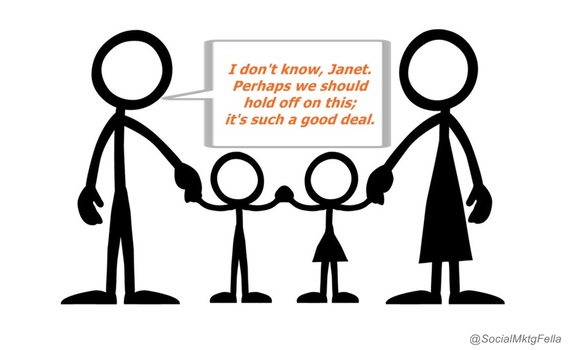The always lovely and astute Christina Farr recently exposed Apple and Facebook's plans to help their female employees freeze their eggs, as every progressive employer should. The announcement brings up a lot of important questions about delaying parenthood, and the evolving "Millennial" definition of family. Far beyond "Mitch and Cam," people.
More and more, people seem to be delaying having children, from celebrities to ordinary people. As Millennials begin to enter a definitive adulthood, will they decide to postpone child-bearing? I looked at some of the reasons people might delay starting a family, and spoke to an expert in cryopreservation to find out what potential risks and benefits lie in postponed parenthood.
First, I looked at an influential report released by Melinda Mills in 2011 tracking parenthood postponement. "Never before have parents in most Western societies had their first children as late as in recent decades," the report begins. "There is clear empirical evidence of postponement of the first child." So, why are people postponing? Mills listed a few contributing factors: more effective contraception, increases for women in education and job options, housing conditions, economic uncertainty, and changes in cultural values.
Many of these factors are logical historical developments -- as women increase their education and career options, they may choose to delay having kids so that they can fully pursue a particular career path. And since 'economic uncertainty' remains a factor in 2014, families may be choosing to wait for greater financial security before they have children, or families may require both parents to work full-time jobs to pay the bills, leaving little time for child-rearing.
Will Millennials Delay Parenthood?
This is a difficult question, but based on the trends indicated in 2011 research, there seems to be a high probability that Millennials will choose to delay parenthood. Here are a few factors that may contribute.
Social Media Makes Them Selfish
We spend over 4 hours per day on average watching television or otherwise engaging with technology. We spend around 45 minutes per day interacting with friends or family members. The rapid evolution of technology would have been enough to narrow our social capacities, but then there's the icing on the cake: social media.
According to AsapSCIENCE, 5 to 10 percent of social media users cannot control how much time they spend online. AsapSCIENCE also reports that up to 80 percent of a social media user's online posts will revolve around "self-involved broadcasting" instead of dialogues that include others. Social media and technology are clearly capable of making us less social, less willing to branch out, and more inclined towards self-indulgence. Being able to take risks, handle change, reorganize priorities, and put social relationships first unselfishly are all traits that could be associated with parenthood.
My verdict? Millennials will try to delay parenthood so they don't have to change their social lifestyles.
College Debt Makes Them Nervous
According to the Project on Student Debt, students who graduated from college in 2013 had an average of $29,400 debt, per borrower. Because that number has climbed steadily since 2008, it makes sense that Millennials may be looking at their account balances before they consider having a child. Debt may put independence out-of-reach for grads. The Atlantic reports that financial fears in the "Boomerang Generation" prompted 45 percent of college graduates to live back home living with family in 2011.
Who wants to start a family while sleeping in the same high school bedroom with Little League runner-up ribbons and Kid Rock posters on the walls?
A Word To The Wise: Can Postponing Parenthood Impact Fertility?
Millennials who delay parenthood may be in for challenges if they decide they want a child later in life.
In an article on delayed parenthood in our culture, Claudi Quigg of The Herald Review notes, "Folks are waiting longer to marry (if they marry at all) and likewise they are putting off bearing children...[but] after the 20s, fertility is challenged for some people. [T]hey may find they have to wait even longer, sometimes seeking the assistance of medical intervention." The Society of Obstetricians and Gynaecologists of Canada warned that postponing parenthood could have serious "reproductive consequences," particularly past age 32.
I spoke to Dr. John Zhang, who founded New Hope Fertility, to get an expert opinion on postponing parenthood. Zhang wasn't surprised to hear about Apple and Facebook's decision. "It is only a matter of time before companies begin to offer cryopreservation benefits along with the current, standard ones we are used to like 401k and dental and vision coverage," Zhang said. "As we see with Facebook and Apple, forward-thinking companies who care about the livelihood of their employees go that extra mile to offer subsidies on gym memberships and encourage work/life balance, and offering cryopreservation support is one more way that companies can show they value the development and happiness of their staff."
When asked if Millennials should consider freezing their eggs, Zhang said, "What is the ultimate expression of love, if not raising a child, helping them grow, learn, live and flourish? I started New Hope Fertility Center to help people with that dream -- because I believe that it is, indeed, essential, yet also a wonderful achievement that all people should be able to have, should they desire it." Apple and Facebook are only the first big names to offer egg freezing alternatives for employees. Will other companies follow suit -- and will Millennials opt in?
2015 should bring all sorts of interesting developments to this complex issue. Meanwhile, for those of you prospective parents eager to gauge your readiness for parenthood, we at Huffington Post leave you with this challenge:



